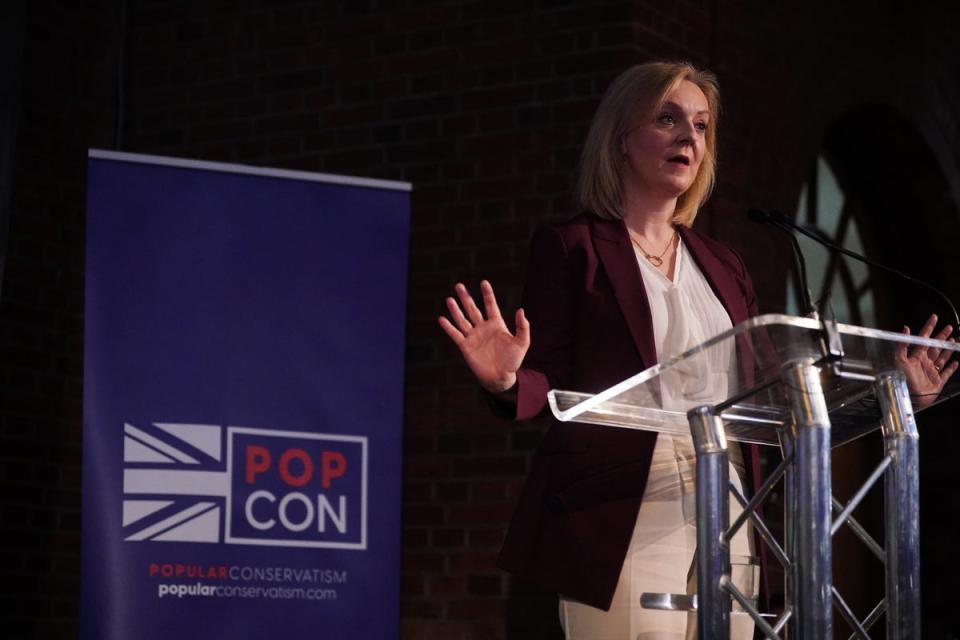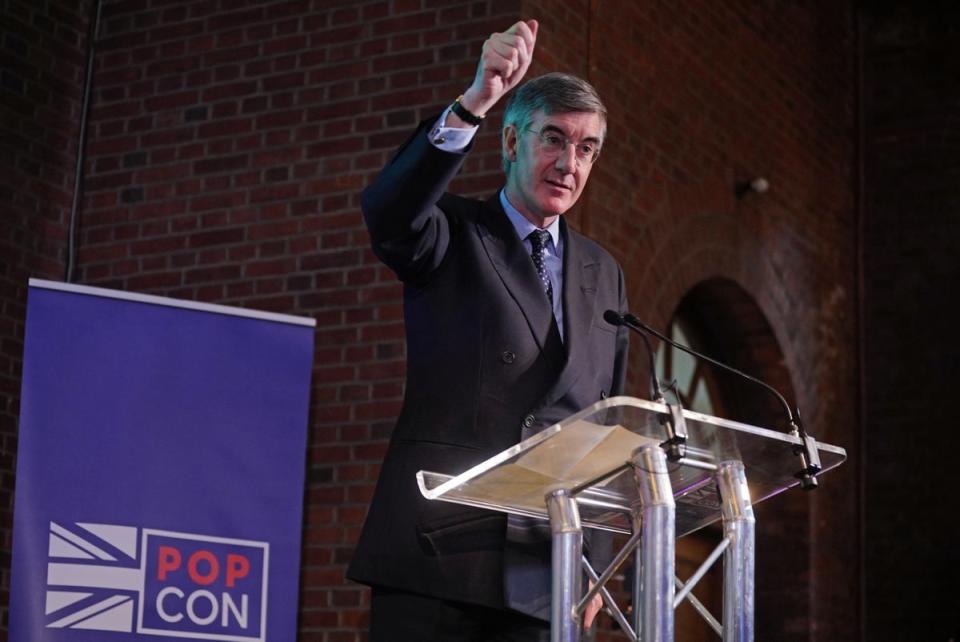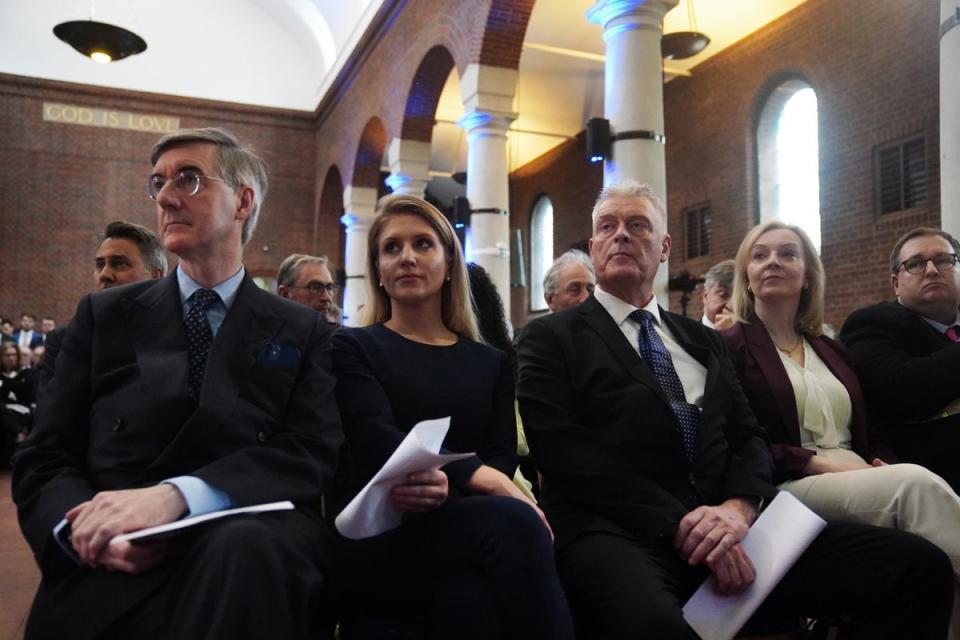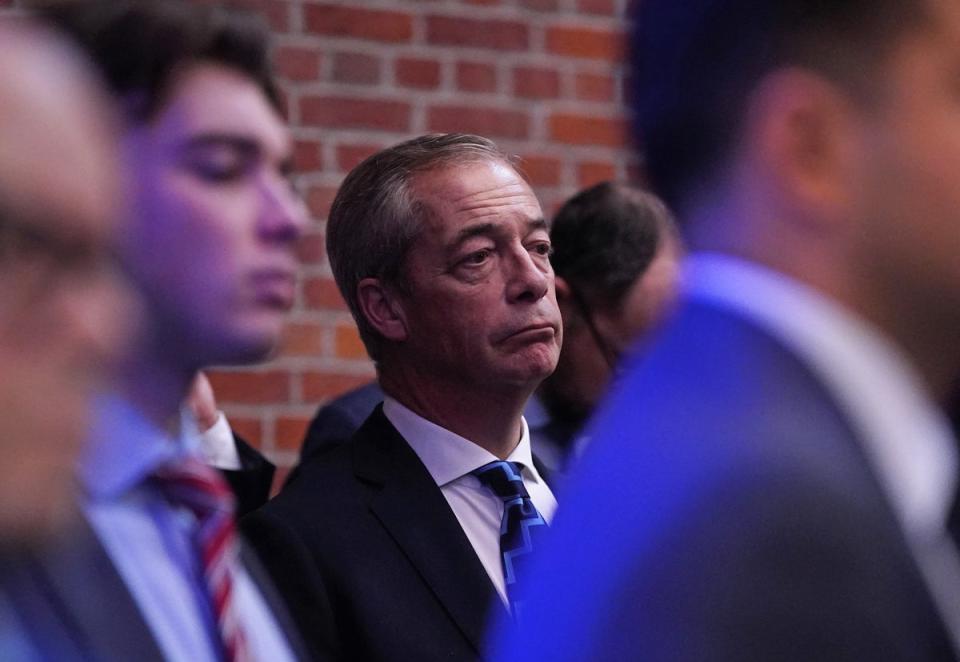Liz Truss ‘PopCons’ comeback bid hit by chaos as key Tory allies drop out
Liz Truss’s attempt to restart her political career with the launch of a new right-wing Tory faction was hit by chaos as some of her closest former allies stayed away.
The launch on Tuesday for Popular Conservatism – also known as the PopCons – was rocked by former Truss chancellor Kwasi Kwarteng’s announcement that he was quitting parliament at the general election.
And close Truss associate Sir Simon Clarke was forced out of the event because of his call for Rishi Sunak to be replaced – with Ms Truss keen to avoid looking too disloyal.
Ms Truss became the shortest-serving prime minister in British history when she was forced from office by her own MPs after a disastrous six weeks in charge, which plunged the country into political and economic turmoil. Famously, during her brief tenure, The King greeted her during their first audience with the words: “So you’ve come back again? Dear oh dear. Anyway…”
There was a further blow when Ranil Jayawardena, another key Truss ally and ex-environment minister in her short-lived government, decided to pull out of the event at the last minute.
It came as Nigel Farage – a star guest at the PopCons launch – dismissed the new group by insisting Mr Sunak would completely ignore all their ideas.
Ms Truss hit out at Mr Sunak’s government for failing to take on “the left-wing extremists” during her launch event speech, attended by allies such as Dame Priti Patel, Lee Anderson, and Sir Jacob Rees-Mogg.
The former prime minister – who spent only six weeks at No 10 before announcing her resignation in disgrace – said Britons want to see lower immigration and want illegal immigrants deported, but efforts are “constantly being stymied”.

She also hit out at the Sunak government for allowing people to choose their gender and for “pandering to the anti-capitalists”, while ordinary people believe “the wokery that is going on is nonsense”.
Ms Truss also claimed the ideology of leftists disguising themselves as environmentalists is about “taking power away from families and giving it to the state”.
Using the conspiratorial rhetoric of Donald Trump, she said the left “have been on the march” in government institutions and corporations around the world.
As well as talking up a shadowy left-wing cabal, Ms Truss also claimed that Britain was “full of secret Conservatives”, saying there were plenty of people who “agree with us but don’t want to admit it because they think it’s not acceptable at their place of work, at their school”.
Ms Truss also said she never got invited to dinner parties. “Too many of our colleagues are looking at what jobs they get when they leave parliament, they want to be popular at London dinner parties. I never get invited to these parties.”
But Mr Kwarteng – once Ms Truss’s closest friend in politics – overshadowed the launch event by revealing on Twitter/X that he will be standing down in his Surrey seat of Spelthorne.
The chancellor, responsible for the mini-Budget debacle, has fallen out with his former boss. He has said she was “not wired” to ever be PM and would have “blown up” something even if they had survived the economic disaster caused by their unfunded tax cuts.

Ms Truss’s closest ally Mark Littlewood, the leader of Popular Conservatism, insisted that he was not interested in ousting Mr Sunak, claiming: “This isn’t about the leadership of the Conservative party.”
The right-wing economist – handed a peerage in the Truss resignation honours – also said it was not about seeking to “replicate or replace” any of the many existing right-wing caucuses of Tory MPs.
Sir Jacob Rees-Mogg also launched an attack on “unaccountable” officials and courts, as he sought to draw parallels with the anger of British voters and the protests by farmers in France and Germany.
In his headline speech, Sir Jacob said: “The age of Davos man is over, of international cabals and quangos telling hundreds of millions of people how to lead their lives.”
He also railed against an “activist judiciary” and an “out-of-touch oligarchy”, as he and other right-wingers push to quit the European Convention on Human Rights (ECHR).
Fellow right-winger Lee Anderson used his speech to claim that only “odd weirdos” care about achieving net zero in the battle against climate change.

The Tories’ former deputy chairman – who quit his role because he rebelled on Mr Sunak’s Rwanda bill – claimed net zero “never comes up” on the doorstep and urged the prime minister to ditch green levies.
Meanwhile, new right-wing favourite Mhairi Fraser, a prospective Tory candidate, attacked Mr Sunak’s “ludicrous” youth smoking ban and other “nanny state policies”.
Mr Farage was largely dismissive of the event – insisting that he was only there to cover it for GB News – as he denied he was interested in joining the Conservative party in future.
“I’m not looking to join the Tory party,” said the Reform UK president. “Not at the moment, given what they stand for. And as far as this group’s concerned – I’d rather be part of Reform because that’s the real thing.”

Mr Farage said none of the PopCons’ ideas will make it into the Tory manifesto, arguing that the party is now “so far away from the centre of gravity of most Conservative voters it is almost untrue”.
Other senior Tories at the PopCons launch were staunch Boris Johnson allies and leading Sunak critics such as Andrea Jenkyns and David Frost – the peer thought to be behind a push to get rid of the current PM.
Other right-wingers in attendance were Truss loyalists Sir Jake Berry and ex-Truss whip Wendy Morton, and the new Tory deputy chairman Brendan Clarke-Smith.
Polling published on Monday suggested Ms Truss is the very least popular politician with the British public, despite her claim to be in touch with “popular” ideas. Her net favourability score is minus 54 per cent, compared with Mr Sunak’s minus 27 per cent, a survey by Savanta found.
The mini-Budget debacle masterminded by Ms Truss and Mr Kwarteng saw a collapse in the pound and a spike in interest rates as markets betted against Britain. The staggering episode cost the country £30bn, according to the Resolution Foundation, and saw poor Tory poll ratings plummet further.


